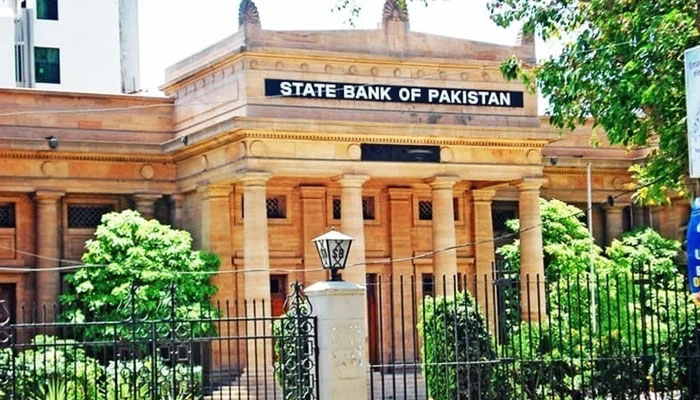Crisis alert: SBP forex reserves fall to $5.8bn
Pakistan’s foreign exchange reserves held by the central bank fell below $6 billion, threatening to further exacerbate the country’s economic woes
KARACHI: Pakistan’s foreign exchange reserves held by the central bank fell below $6 billion, threatening to further exacerbate the country’s economic woes unless policymakers urgently secure financing from the International Monetary Fund and friendly countries.
The foreign reserves decreased by $294 million to $5.8 billion as of December 23, the State Bank of Pakistan said in a statement on Thursday. The reserves hit the lowest level since April 2014.
High external debt repayments and lack of foreign currency inflows have further eroded the country’s reserves, which are now equal to just five weeks of imports.
Pakistan’s total reserves declined $293 million to $11.7 billion. The reserves of commercial banks, however, inched up $1 million to $5.9 billion.
The amount of reserves has rapidly decreased to a dangerous level, according to analysts. The official reserves may exhaust very soon if urgent arrangements are not made for the cash dollars.
A decrease in these foreign exchange reserves poses a threat to debt repayment as well as to imports. The low levels have raised a red flag as the government is expected to make debt repayments of over $1 billion to two foreign commercial banks early next month. The IMF’s loan programme has been pending since September. China and Saudi Arabia have so far abstained from lending money to Pakistan in the absence of the IMF’s cover.
“The reserves are at a risky level, and if the necessary steps are not made to secure inflows as quickly as feasible, we will soon run out of reserves. Reviving the IMF programme and announcing agreements with friendly countries for fresh funding are necessary,” said Dr Salman Shah, the former finance minister.
However, finance minister Ishaq Dar asserted that the government has complied with all IMF requirements, including the fuel tax (also known as the petroleum development levy). There is no possibility of default as the government has managed to arrange the $31-32 billion required for FY2023 and foreign reserves will be in a better position by the end of this fiscal year, according to Dar.
Fahd Rauf, the head of research at Ismail Iqbal Securities, said that everything depends on Saudi flows and the IMF and that he finds the scenario regarding the deteriorating external finances to be “very worrying.”
“The government needs to act quickly. Either take painful steps or step down and hands over to caretakers,” Rauf added.
The country’s economy is under growing pressure as reserves deplete fast. The central bank has still strong controls over imports due to the dollar crunch. Many businesses have halted operations due to a lack of raw material amid import controls.
-
 Wiz Khalifa Reveals Unconventional Birthday Punch Tradition With Teenage Son In New Video
Wiz Khalifa Reveals Unconventional Birthday Punch Tradition With Teenage Son In New Video -
 BAFTAs 2026: Kerry Washington Makes Debut In Custom Prada Gown
BAFTAs 2026: Kerry Washington Makes Debut In Custom Prada Gown -
 Jennifer Lopez Gets Emotional As Twins Max And Emme Turn 18
Jennifer Lopez Gets Emotional As Twins Max And Emme Turn 18 -
 Andrew Mountbatten Windsor Blunders Are Result Of 'conspiracy Of Silence'
Andrew Mountbatten Windsor Blunders Are Result Of 'conspiracy Of Silence' -
 Keith Urban Fires Entire Management Team After Divorcing Nicole Kidman
Keith Urban Fires Entire Management Team After Divorcing Nicole Kidman -
 Kylie Jenner Marks Death Anniversary Of Hairstylist Jesus Guerrero With '222' Tribute
Kylie Jenner Marks Death Anniversary Of Hairstylist Jesus Guerrero With '222' Tribute -
 Daniel Radcliffe On How It's Like Seeing New Harry Potter Cast Years Later
Daniel Radcliffe On How It's Like Seeing New Harry Potter Cast Years Later -
 Andrew Portrait Makes Unexpected Debut At Louvre Museum Over Epstein Protest
Andrew Portrait Makes Unexpected Debut At Louvre Museum Over Epstein Protest -
 Italy: Skeleton Of Saint Francis Of Assisi’s Goes On Public Display For First Time After 800 Years
Italy: Skeleton Of Saint Francis Of Assisi’s Goes On Public Display For First Time After 800 Years -
 Hailey Bieber's Subtle Gesture For Eric Dane’s Family Revealed
Hailey Bieber's Subtle Gesture For Eric Dane’s Family Revealed -
 Moment Prince William 'broke Down' And 'apologised' To Kate Middleton
Moment Prince William 'broke Down' And 'apologised' To Kate Middleton -
 Paul Mescal And Gracie Abrams Stun Fans, Making Their Romance Public At 2026 BAFTA
Paul Mescal And Gracie Abrams Stun Fans, Making Their Romance Public At 2026 BAFTA -
 EU Rejects Any Rise In US Tariffs After Court Ruling, Says ‘a Deal Is A Deal’
EU Rejects Any Rise In US Tariffs After Court Ruling, Says ‘a Deal Is A Deal’ -
 King Charles Congratulates Team GB Over Winter Olympics Success
King Charles Congratulates Team GB Over Winter Olympics Success -
 Meryl Streep Comeback In 'Mamma Mia 3' On The Cards? Studio Head Shares Promising Update
Meryl Streep Comeback In 'Mamma Mia 3' On The Cards? Studio Head Shares Promising Update -
 Woman Allegedly Used ChatGPT To Plan Murders Of Two Men, Police Say
Woman Allegedly Used ChatGPT To Plan Murders Of Two Men, Police Say




